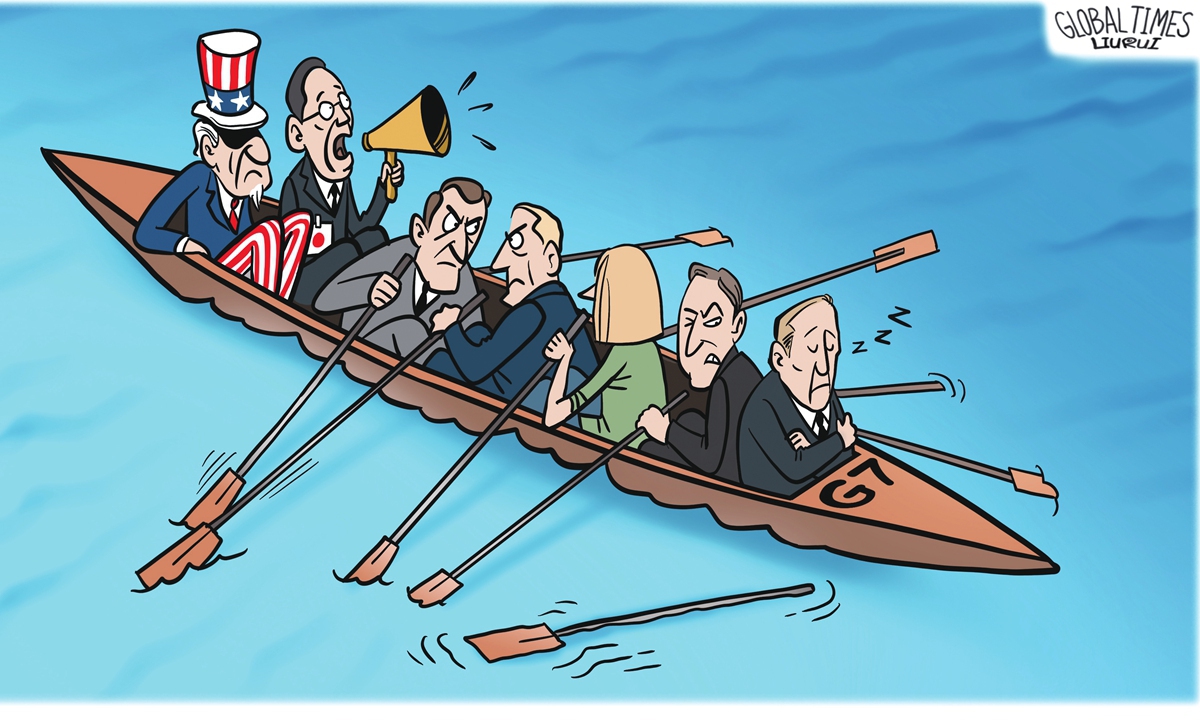
Illustration: Liu Rui/GT
The Group of Seven (G7) appears to be using so-called economic coercion accusations to put pressure on China, but this strategy only exposes its own hypocrisy and double standards. The fact that the bloc itself is the real one engaging in economic coercion is evident in its own statement.
G7 trade ministers said in a statement on Wednesday that they would use their "trade tools" if needed to "tackle non-market policies and practices, as well as harmful non-market excess capacity and other market distortions resulting from them," Reuters reported.
Reading this statement makes us shudder at the thought of returning to the days of imperial colonial plunder.
The statement makes no mention of China, but it's clear to everyone that China is the target. It is also clear to all who is really distorting the market and weaponizing economic issues.
In the statement, the G7 trade ministers called on countries to refrain from using economic coercion, and they condemned any attempt to weaponize economic dependencies. Nevertheless, this call has been seen as ironic by many, because some G7 member countries are precisely engaging in economic coercion and political blackmail by politicizing economic issues and disrupting normal economic and trade relations.
They remain "committed to effectively using our trade tools, and, as appropriate, develop new tools," according to the statement.
Considering their actions, the double standards and hypocritical rhetoric of G7 member countries will only serve to highlight their true nature as thieves crying "catch the thief," as they are the ones that are actually using economic issues as weapons to maintain their dominant positions in the global economy and further their own political and economic interests.
If G7 member countries are truly committed to maintaining the fairness and transparency of international trade, how can they not see the US abusing its economic hegemony to pressure other countries through trade sanctions, tariff barriers, high-tech sanctions and other means to force them to accept its political and economic blackmail?
Examples of the G7's use of economic coercion can be easily found in its imposition of sanctions on other countries in the past.
For example, Washington's crackdown against the cotton industry of China's Xinjiang region on the grounds of so-called "forced labor" not only constitutes unwarranted interference in China's internal affairs, but is also a politically motivated tactic aimed at exerting economic pressure. Through imposing restrictions on the import of Xinjiang cotton, the US is actively seeking to undermine China's standing in the global supply chain, a move that flagrantly disregards the principles of free trade.
Last week, under a preliminary agreement driven by "security considerations," the German government and telecom carriers in the country agreed in principle on steps to take out components made by Chinese companies from the nation's 5G wireless network over the next five years. This overstretching of the security concept in normal business operations harms Chinese companies' legitimate rights and damages mutual trust between China and Germany.
Last month, Japan unveiled trade restrictions against firms in China, India, Kazakhstan and Uzbekistan over alleged support for Russia.
These unreasonable sanctions and government decisions are actually typical examples of politicizing economic issues, which have far-reaching negative effects on global economic and trade stability.
While upholding the banner of free trade, the G7 countries take disruptive actions toward global supply chains for political reasons, heightening market uncertainty.
The G7 countries' trade protectionism and economic sanctions against China indirectly affect developing nations and emerging markets, which heavily rely on the China market for exports and development opportunities. China is an integral player in the global economy, and its growth benefits itself and also drives worldwide economic progress.
In this sense, the G7's attempt to pressure China over its political agenda undermines global supply chains and the global trading system, while jeopardizing the stability and progress of the global economic recovery.




